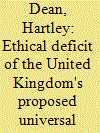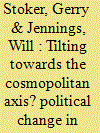| Srl | Item |
| 1 |
ID:
112084


|
|
|
|
|
| Publication |
2012.
|
| Summary/Abstract |
Universal Credit is a proposed means-tested cash benefit scheme in the UK that will serve, inter alia, to top-up the wages of low-paid workers. This article will argue first, that the moral justification for the scheme that is offered by the UK government is specious; second that the reconfiguration of existing wage top-ups may be counterproductive and will in any event do little, if anything, to promote the work ethic; third, that the new scheme will not relieve but add to the injustices borne by the 'precariat' (the workers engaged in low-paid precarious employment); finally, that far from having a justifiable moral purpose, Universal Credit is ethically flawed.
|
|
|
|
|
|
|
|
|
|
|
|
|
|
|
|
| 2 |
ID:
155403


|
|
|
|
|
| Summary/Abstract |
The general election of June 2017 revealed a continued tilting of the political axis in England that has been long in the making. This was not a Brexit ‘realignment’—in that the vote is better seen as a symptom of a longer-term divide that is emerging between citizens residing in locations strongly connected to global growth and those who are not. In this analysis, we explore constituency-level patterns of voting in England between 2005 and 2017. Over this period, Labour's vote share has tended to rise in urban areas (that is, major cities), with younger and more diverse and more educated populations often working in ‘cosmopolitan’ industries, whereas the Conservative vote has tended to increase in less densely populated towns and rural areas, with older and less diverse populations. Significantly, Labour has also increased its vote in constituencies with a higher share of ‘precariat’ and emerging service workers—somewhat at odds with characterisation of a party that has lost the ‘left behind’. To the extent that changes in electoral support for the Conservatives and Labour are linked to the Brexit vote, the relationship far predates the referendum vote and should be expected to continue to reshape British politics in future.
|
|
|
|
|
|
|
|
|
|
|
|
|
|
|
|